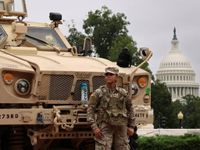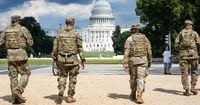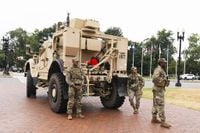In a dramatic escalation of federal intervention, President Donald Trump has ordered more than 1,100 National Guard troops from six Republican-led states to Washington, D.C., declaring a public safety emergency and temporarily federalizing the city’s police force. The move, announced on August 11, 2025, marks a striking exercise of presidential authority over the nation’s capital and has ignited fierce debate about its necessity, legality, and political motivations.
Trump’s latest crackdown comes amid his repeated claims that Washington is beset by violent crime and homelessness, a characterization that local officials and crime statistics dispute. In a statement, Trump said the city was facing a “crime emergency,” prompting his decision to deploy 800 D.C. National Guard troops and request reinforcements from Republican governors in Louisiana, Mississippi, Tennessee, West Virginia, South Carolina, and Ohio.
The deployments, which the federal government is funding, quickly followed. Louisiana Governor Jeff Landry approved the dispatch of about 135 National Guard soldiers, writing on social media, “We cannot allow our cities to be overcome by violence and lawlessness. I am proud to support this mission to return safety and sanity to Washington, D.C. and cities all across our country, including right here in Louisiana.” Mississippi Governor Tate Reeves echoed those concerns, sending 200 soldiers and stating, “Crime is out of control there, and it’s clear something must be done to combat it.” Tennessee Governor Bill Lee added 160 Guard troops, whose duties include monument security, community safety patrols, protecting federal facilities, and traffic control, according to his press secretary.
Other Republican-led states joined the surge. West Virginia Governor Patrick Morrisey announced the deployment of 300-400 skilled personnel and mission-essential equipment, while South Carolina Governor Henry McMaster authorized 200 Guards members with the caveat that they could be recalled in the event of a local natural disaster. Ohio Governor Mike DeWine sent 150 military police, noting the request had come directly from Army Secretary Dan Driscoll’s office. “These Ohio National Guard members will carry out presence patrols and serve as added security,” DeWine explained.
In total, more than 1,100 National Guard troops from these six states are expected to be on the ground in D.C. within days, supplementing the 800 D.C. National Guard troops already deployed and a host of federal agencies—including the FBI—now patrolling the city’s streets.
The extraordinary scale of the operation is underscored by the administration’s directive to federal prosecutors in Washington to pursue the highest possible charges against those arrested in the crackdown. According to Reuters, Jonathan Hornok, head of the criminal division of the U.S. Attorney’s Office in Washington, instructed prosecutors on August 18 to maximize federal cases, a move that could lead to stiffer sentences and strain the court system. A spokesperson for U.S. Attorney Jeanine Pirro stated, “In line with President Trump’s directive to make D.C. safe, U.S. Attorney Pirro has made it clear that the old way of doing things is unacceptable. She directed her staff to charge the highest crime that is supported by the law and the evidence.”
Despite the administration’s claims, federal and city statistics tell a different story. Violent crime rates in Washington have dropped sharply since a spike in 2023, with the city recording a 30 percent decrease from 2023 to 2024—a trend that has continued, according to city data cited by Reuters and Al Jazeera. The murder rate, however, remains higher than in most other large U.S. cities. Trump’s depiction of a city “overrun with violence and homelessness” has been flatly rejected by local officials, who argue that the federal intervention is unnecessary and potentially counterproductive.
The legal and political fallout has been swift. After a challenge by the city’s attorney general, the Trump administration negotiated a deal with Mayor Muriel Bowser to retain Police Chief Pamela Smith as head of the department’s operations, despite the federal takeover. Meanwhile, the Department of Justice has opened an investigation into allegations that D.C. police officials may have falsified crime data—a probe first reported by The New York Times and confirmed by The Associated Press. Earlier this year, a Metropolitan Police Department commander suspected of manipulating crime data was placed on paid administrative leave, according to NBC Washington.
The question of whether National Guard troops will be armed has further heightened tensions. While Pentagon and Army officials initially stated that weapons would remain in the armory, the D.C. National Guard has since clarified that troops “may be armed consistent with their mission and training.” Maj. Melissa Heintz, a spokesperson for the D.C. Guard, said their presence is focused on supporting civil authorities and ensuring community safety, but did not offer specifics on when or where armed troops might be deployed.
Critics have slammed the deployment as political theatre and raised concerns about its legality under the Posse Comitatus Act of 1878, which generally bars the use of the military in civilian law enforcement. The Centre for American Progress was blunt: “The Trump administration’s overreach is not going to make Washington, D.C. safer and is dangerous political theatre that imperils democracy in the nation’s capital and beyond.” Legal experts warn that while the president has broad authority over the D.C. National Guard, attempts to replicate such interventions in other Democrat-led cities could face significant legal hurdles.
On the ground, the immediate impact of the crackdown is mixed. Since the operation began 12 days ago, U.S. Attorney General Pam Bondi reported on X that 465 arrests have been made—an average of 39 per day. By comparison, the city’s Metropolitan Police Department averaged 61 arrests per day in 2024. Meanwhile, restaurant reservations in D.C. have dropped nearly 18 percent since the federal takeover, according to data published by OpenTable, despite Trump’s claim that people feel safer and restaurants are “busier than they’ve been in a long time.”
The deployment coincides with Hurricane Erin churning in the Atlantic, prompting warnings along the East Coast. South Carolina’s Governor McMaster assured residents that his state’s National Guard could be recalled immediately if the hurricane or another natural disaster threatened South Carolina.
Trump’s aggressive posture in Washington follows a similar deployment of thousands of National Guard troops and active-duty Marines to Los Angeles two months ago, amid protests over his administration’s immigration raids—a move that is still being challenged in court by California’s Democratic governor. Legal observers are watching closely to see whether the latest intervention in D.C. will survive judicial scrutiny.
As the capital adjusts to the influx of troops and heightened federal presence, the debate over the balance between security and civil liberties, federal authority and local control, rages on. With crime rates falling and legal challenges mounting, the true impact—and the political cost—of Trump’s unprecedented intervention remains to be seen.



